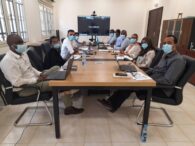5th ACE Impact Virtual Regional Workshop Concludes in Success
5th ACE Impact Virtual Regional Workshop Concludes in Success
ACEs Convene to Assess Project Progress and Strengthen Research Across Africa
The 5th Africa Higher Education Centres of Excellence for Development Impact (ACE Impact) Workshop was held virtually from May 24th -28th, 2021. The meeting was well attended with over 450 participants from the fifty-three (53) Centres of Excellence, government representatives from participating countries, Vice Chancellors, higher education stakeholders, the private sector, policy think tanks, subject matter experts and partners such as the World Bank (WB), the French Development Agency (AFD) and the Association of African Universities (AAU). The meeting provided the platform for peer learning among the centres. It also created the avenue for centres to build networks, and forge partnerships for project implementation and sustainability. The workshop focused on assessing progress in the implementation of the project, highlights on the digital education network project, which seeks to exploit the advances in digital technologies for education towards the transformation of teaching practices for the benefit of students; inter ACE Impact networking initiatives; ACE Impact project’s engagement with the Partnership for skills in Applied Sciences, Engineering and Technology (PASET).
Remarks from Partners
The workshop commenced with welcome remarks from the AAU Secretary General, Prof. Etienne Ehile, the World Bank Education Practice Manager Halil Dundar and Dr. Quentin Delpech on behalf of Marion Aubourg, Deputy Director, AFD Education Division. In his address, Professor Ehile commended the ACE Impact stakeholders- the RFU, WB, AFD, Experts and centres for their commitment, flexibility, and innovativeness in ensuring the implementation of the project despite challenges posed by the COVID-19 pandemic. He noted some achievements at par with the project development objectives including expansion of access to quality programs, quantity of education, strategic regional specialization and collaboration and development impact of Education globally. He concluded that, the evolving educational landscape presents an opportunity for the African Higher Education Institutions to exploit transformative teaching and learning skills and knowledge. In addition, Mr. Dundar from the World Bank reiterated the need to improve quality teaching and learning in Africa HEI through innovation. Mr. Dundar explained that the ACE Impact Project has chalked remarkable successes despite operational challenges faced as a result of the COVID pandemic, particularly in research and innovation, noting the contributions of some ACEs such as ACEGID (African Centre of Excellence for Genomics of Infectious Diseases) WACCBIP (West African Centre for Cell Biology of Infectious Pathogens) in managing the pandemic in their respective countries and continentally. Again, he commended the AAU’s dedication in the implementation of the project. Centres were encouraged to leverage on the meeting to broker partnerships and networks. In his remarks, Dr. Delpech also emphasized the AFD’s continuous commitment and support to the project.
Update on Project’s Progress
In presenting the Project Progress Report, Dr. Sylvia Mkandawire, the ACE Impact Project Manager noted that between October 2020 and May 2021, the project successfully held – capacity building webinars in Communication, M&E, Institutional accreditation, publications and scientific communication, program accreditation. 44 virtual meetings across the 10 participating countries to engage centres & experts in accelerating approval of Annual Workplans and technical support across DLRs.
Breakdown of centres’ achievements in line with the Disbursement Linked Indicators (DLIs) are indicated below:

Networking and Peer Learning
Building networks and forging sustainable partnerships are vital benchmarks in making impactful contributions to Africa’s development. In view of this, the ACE Impact Project provides the platform for peer learning among the ACEs and inter- ACE collaborations through the establishment of thematic and educational networks as well as the bi-annual workshops. The project also encourages partnerships with industries and institutions outside the region. The fifth ACE Impact workshop provided a forum for centres to share their experiences and seek expert advice in areas they find challenging. The parallel sessions and clinics held on Wednesday May 26 and Thursday May 27 respectively facilitated the exchange of ideas and expert recommendations in meeting project goals and objectives. The parallel sessions and clinics covered M&E verification, Procurement, Financial Management and Disbursement, Safeguards and Institutional safeguards, presentations and discussions were led by specialists from the Association of African Universities and the World Bank.

Transformative Research Undertaken by the Centres
Centres were also given the opportunity to highlight some research conducted in addressing developmental challenges. Director for the West African Centre for Crop Improvement (WACCI) in Ghana, Professor Eric Y. Danquah provided an overview of new maize hybrids developed by the centre which are aimed at enhancing genetic gains for food and nutrition security in Ghana and beyond. In addressing low productivity in yields, plant breeders can contribute to higher yields by developing improved varieties that are suited to their countries’ particular agro-ecological conditions. Through extensive research, the new maize hybrids developed by the centre are high yielding maize varieties which take between 80-95 days to mature. They include the “Abeefo Aburo, Akuafo Aburo and Legon Aburo”. He concluded that, working through strategic partnerships can help improve the human conditions through plant science.
Also, OUSMANE YOUME from the Centre of Excellence in Mathematics, Informatics and ICT in Senegal presented on “Deep Learning and Remote Sensing: Detection of Dumping Waste using UAC.” The research is crucial as environmental protection remains vital to sustainable development. Through the application of deep learning and architecture, the research introduced techniques to detect and segregate waste to facilitate its treatment, tools for environment monitoring, as well as detection of anomalies such as dumping waste, flooding, among others. These, among other research conducted at the centre underscores the contributions and impact made by the centres of excellence continentally.
